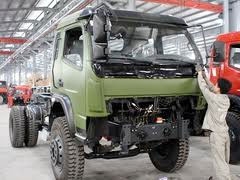Incentives to boost auto industry
 |
| illustration photo |
The final draft on Vietnam's auto development strategy to 2020, with a vision to 2030, has been completed by the MoIT for submission to the government for approval.
The document notes several crucial targets, including increasing exports and setting up an auto manufacturing and support hub in central Vietnam with total investment worth VND30 trillion ($1.46 billion).
The ministry said the establishment of the auto production centre in Chu Lai Open Economic Zone, central Quang Nam province, during the next several years would help boost the domestic auto industry at a time when many taxes on auto imports were set to be removed.
The centre is expected to produce auto parts for 40 to 80 per cent for all vehicles made in Vietnam.
In an effort to set up the auto manufacturing centre soon, Quang Nam province has completed a plan on building a national mechanical auto centre with initial investments from two South Korean auto makers, Kia and Hyundai.
The province has also requested the government to allow Quang Nam to support site clearance and give land lease exemptions with full infrastructure for investors during construction work on the project.
In regards to tax policies, Quang Nam is proposing to collect a corporate income tax of 10 per cent during the project's first 30 years. In addition, investors would be given a corporate income tax exemption during the first 10 years of making a profit and a 50 per cent reduction for the next nine years.
Also, import and special consumption taxes would be extended and many other soft policies would be offered for investors in the auto centre.
Meanwhile, the MoIT has suggested a corporate income tax rate of 10 per cent for the entire life of the project, a 50 per cent reduction of special consumption tax for auto projects that meet criteria on localisation ratios.
The ministry forecast domestic auto demand would surge, with 400,000 to 600,000 vehicles sold per year by 2020 when the nation's average per capita income is expected to reach $2,844 per annum.
By 2030, domestic auto demand would reach nearly 900,000 to 1.8 million vehicles per year. Of this, demand for cars would account for more than 60 per cent and passenger cars, trucks and special vehicles would account for the remainder.
The strategy also aims to boost sales of cars made in Vietnam , expanding the domestic industry's production capacity to 430,800 vehicles per year by 2020. The locality proportion is expected to reach 50 per cent to 60 per cent by the same year.
The auto industry is expected to export 65,000 vehicles per year by 2020, along with a total export turnover of $4 billion from auto parts.
At a recent seminar, several domestic auto producers said that soft policies should not only apply to auto manufacturers who set up their factories at Chu Lai, but that the new strategy should be based on the current situation in order to take advantage of capital already invested.
They said authorities should review current trends in the auto industry to help it develop in a sustainable way.
Experts said authorities should be cautious when giving too many incentives to auto makers as they might not increase their locality proportion commitments.
What the stars mean:
★ Poor ★ ★ Promising ★★★ Good ★★★★ Very good ★★★★★ Exceptional
 Tag:
Tag:
Related Contents
Latest News
More News
- Foreign fruits flood Vietnamese market (December 09, 2025 | 13:22)
- Vietnam’s fruit and vegetable exports reach $7.8 billion in first 11 months (December 05, 2025 | 13:50)
- Vietnam shapes next-generation carbon market (November 26, 2025 | 15:33)
- PM urges Ho Chi Minh City to innovate and remain Vietnam’s economic locomotive (November 26, 2025 | 15:29)
- Experts chart Vietnam's digital finance path: high hopes, high stakes (November 14, 2025 | 10:56)
- Vietnam’s seafood imports surge 30 per cent in first 10 months (November 10, 2025 | 19:35)
- Vietnam’s durian exports hit $1 billion milestone (October 30, 2025 | 17:41)
- Beyond borders: Sunhouse and new era of Vietnamese brands on Amazon (October 28, 2025 | 10:46)
- Record-breaking trade fair set to open in Hanoi (October 15, 2025 | 15:59)
- Timber sector seeks solutions to VAT refunds (October 14, 2025 | 18:58)



















 Mobile Version
Mobile Version